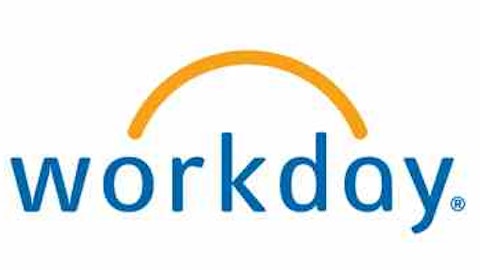
Applications have overtaken infrastructure as the heart of the cloud, and this may mean changes in your portfolio.
salesforce #1
The largest Cloud Service Provider, according to the site, is no longer Amazon.Com. It’s salesforce.com, inc. (NYSE:CRM).
salesforce.com, inc. (NYSE:CRM) had $3 billion in cloud revenue last year, TalkinCloud said. The company has long been considered more of a Software as a Service (SaaS) operation than a cloud provider, built on marketing applications based on an Oracle database.
Applications cost much more money to deliver than infrastructure, although they provide the real value in cloud, and salesforce.com, inc. (NYSE:CRM)’s numbers reflect this. The company hasn’t had any operating earnings since 2011, and it continued to lose money for the first quarter of 2013, $40 million worth. The company is betting on its investment cash flow to keep functioning – that came in at over $1 billion over the last three months.
Because it is committed to Oracle hardware, and recently renewed those vows, salesforce.com, inc. (NYSE:CRM) doesn’t get the kinds of savings you expect to get from cloud. Its debt level has been rising, now standing at 25% of equity. But the amount of cash on its balance sheet has also been increasing, and at the end of its last quarter it had enough cash to pay off that long-term debt with a check.
As with Amazon, investors are betting that top-line growth will eventually hit the bottom-line. The company is growing at nearly 30% each year, and its latest quarter seems to argue it can keep that pace, $892 million in sales against $695 million in the same quarter last year.
International Business Machines Corp. (NYSE:IBM) agreed to pay an estimated $2 billion for SoftLayer in June, and now we know why. Softlayer is actually higher on the TalkinCloud list than International Business Machines Corp. (NYSE:IBM) itself, sitting at number seven with estimated revenues of $355 million.
While salesforce.com, inc. (NYSE:CRM) is pushing cloud applications, SoftLayer offers a cloud platform, featuring tools with which companies can create their own applications. Its data centers represent a major expansion of IBM’s own network, and since SoftLayer was also supporting Citrix’ CloudStack, it brings additional flexibility to a company that committed to OpenStack infrastructure last year.
International Business Machines Corp. (NYSE:IBM) has been pushing the idea that cloud is complex, and insecure. It’s pushing every government audit that worries about the issue, like this one from NASA and is trying to get Amazon’s contract with the CIA cancelled over the issue.
Moving up the Stack
What is most clear about the new TalkinCloud list is that cloud technology continues to be dominated by third parties, essentially public clouds or public cloud customers, which are providing very specific applications to defined markets. The private cloud that companies like International Business Machines Corp. (NYSE:IBM) have been depending on for growth, in which companies move their existing applications to cloud platforms, has not yet materialized.
This game has much further to go. It will play out throughout the decade. Right now, the higher up in the stack you are – and applications are at the top – the more cash you can generate. But the profits are still to come.
I still have shares in International Business Machines Corp. (NYSE:IBM), and I haven’t invested in any other cloud company. But I’m a conservative investor. If you’re more willing to take a chance, consider salesforce.com, inc. (NYSE:CRM).
The article Heart of Cloud Moves to Applications originally appeared on Fool.com and is written by Dana Blankenhorn.
Dana Blankenhorn owns shares of International Business Machines (NYSE:IBM).. The Motley Fool recommends Salesforce.com. The Motley Fool owns shares of International Business Machines. Dana is a member of The Motley Fool Blog Network — entries represent the personal opinion of the blogger and are not formally edited.
Copyright © 1995 – 2013 The Motley Fool, LLC. All rights reserved. The Motley Fool has a disclosure policy.




